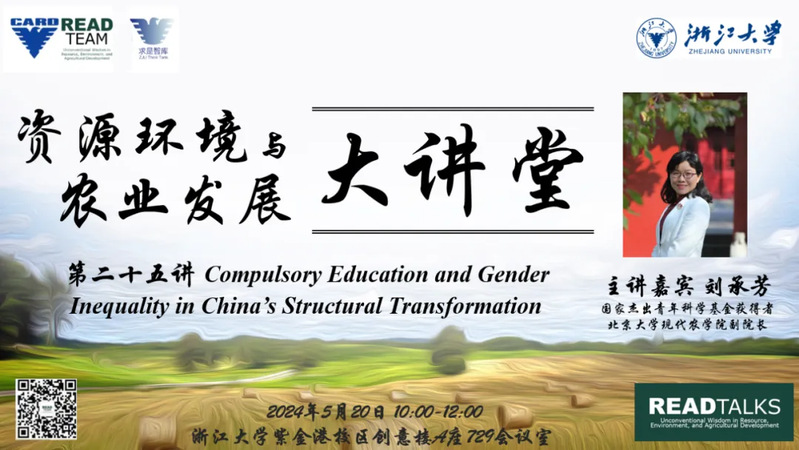
“求是智库”系列讲座:浙大卡特三农学术论坛之273期暨资源环境与农业发展大讲堂第25期将于2024年5月20日(周一)中午举行,本期READ邀请到北京大学博雅特聘教授,现代农学院副院长刘承芳老师。她的讲座题目是《Compulsory Education and Gender Inequality in China’s Structural Transformation》。讲座具体信息如下:
主办单位:
浙江大学中国农村发展研究院
协办单位:
浙江大学社会科学研究院
浙大卡特资源环境与农业发展研究团队
讲座时间:
2024年5月20日中午10:00-12:00
讲座地点:
浙江大学紫金港校区创意楼A座729会议室
主讲人:

刘承芳
国家杰出青年科学基金获得者
北京大学现代农学院副院长
刘承芳,北京大学博雅特聘教授,现代农学院副院长,中国农业政策研究中心副主任,“国家杰青”(2019年)。2008年获美国加州大学(戴维斯)农业与资源经济学博士学位。主要从事城乡协调发展研究,重点关注农村人力资本(教育、营养和健康等)与农村转型,迄今在Journal of Development Economics, Journal of Labor Economics等国内外期刊发表论文140多篇,专著3部。提交政策报告20多份,其中一半以上获领导人批示,绝大多数被中办或国办采用。有关儿童卫生健康的研究成果得到2019年诺贝尔经济学奖得主Michael Kremer教授的高度评价。担任世界粮食计划署(WFP)等机构的咨询专家,任美国农业与应用经济学会(AAEA)中国分会主席(2019-2021),China Agricultural Economic Review 副主编(2023年至今),中国农业经济学会副秘书长(2023年至今)。
主持人:
钱文荣 浙江大学中国农村发展研究院院长 浙江大学公共管理学院副院长
内容提要:
Economic growth has typically been accompanied by a process of structural transformation, in which workers reallocate from agriculture to manufacturing and services. This paper examines whether education can play a role in mitigating gender inequality in the process of sectoral reallocation of labor by exploiting the exogenous variations induced by the implementation of the 1986 Compulsory Education Law (CEL) in China. Using data from the 2018 wave of the China Family Panel Studies (CFPS) and a cohort difference-in-differences (DID) approach, we find that the CEL narrowed the gender gap in education for rural residents, but exacerbated gender inequality in labor market outcomes (e.g., annual wage income, monthly wage, and weekly working hours). Our analysis reveals that this widened gender inequality in labor market outcomes can be explained by gender differences in migration and occupational choices. Specifically, conditional on CEL exposure, rural males tended to migrate outside local provinces and work in low-skilled manufacturing sectors, while rural females were more likely to stay within local counties and work in low-skilled service sectors. We further provide evidence that their differential migration responses are related to household labor divisions and social gender norms, but not to gender gaps in cognitive skills.
欢迎广大师生参与!


